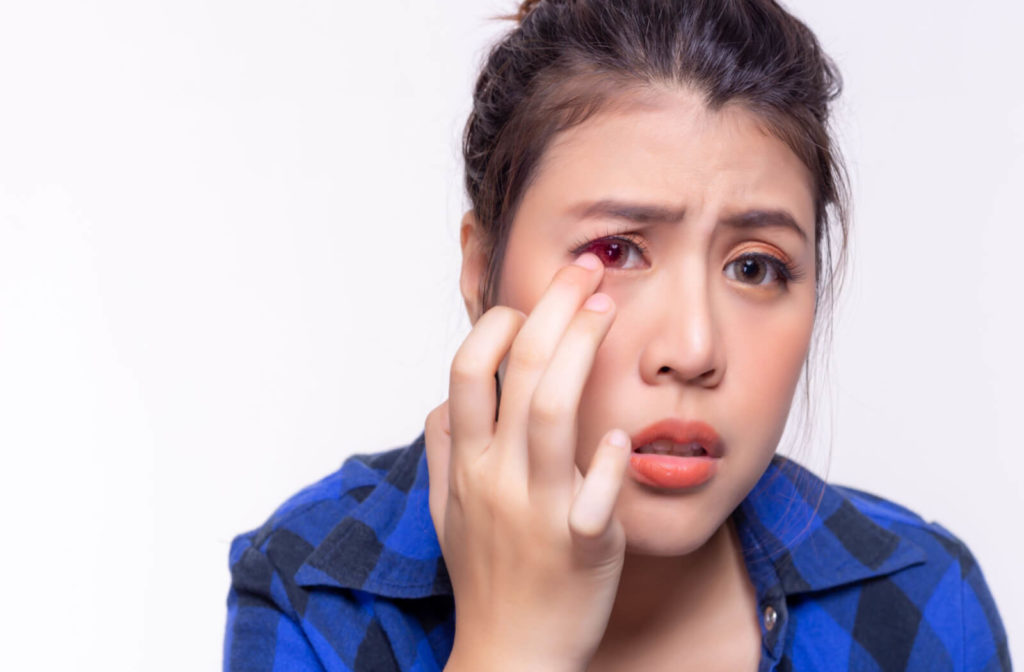Most of us have probably dealt with the unsightly and uncomfortable condition of pink eye at some point in our lives. Depending on the cause, it can be easy to deal with, but it may also require medication. So, if you’re developing symptoms, it’s a good idea to see an eye doctor for an eye examination right away.
Another thing that can complicate pink eye is if you usually wear contact lenses. Most eye doctors will strongly recommend that you do not wear contacts during a case of pink eye. Even after the cause is diagnosed and treatment begins, they will still likely tell you to avoid contact lenses. Let’s take a look at what this condition is and why you shouldn’t wear contacts.
What Is Pink Eye?
Pink eye is also known as conjunctivitis because it affects the conjunctiva, a transparent membrane on the inside of your eyelid. Fortunately, the condition often looks far worse than it is. While extremely irritating, pink eye will rarely affect your vision significantly or permanently.
Symptoms of Pink Eye
Pink eye may affect one or both eyes. Here are several common symptoms of the condition:
- Red, bloodshot-looking eyes
- An irritating, sandy feeling in your eyes
- Itchiness
- Trouble opening your eyes when you wake up because of dried discharge
- Blurred vision
- Sensitivity to light
- Swelling in your eyelids
- Excessive tear production
Keep in mind that these symptoms can also be caused by other conditions, so if the symptoms don’t improve within a day or two, make an appointment with your eye doctor. This way, they can rule out any other possible causes and advise you on treatment.
Causes of Pink Eye
Three common things that cause pink eye are:
- Bacteria or Virus: In most cases, bacteria or viruses are to blame for conjunctivitis. More specifically, adenovirus is one of the most common causes. However, several other viruses could be the cause as well. Improperly cleaned contact lenses are an easy way for these viruses or bacteria to get into your eyes. So, if you wear contacts, it’s important to always clean them properly.
- Allergies: Allergic conjunctivitis will affect both of your eyes. Unfortunately, if something seasonal such as pollen causes it, you’ll have to deal with it every year. On the plus side, allergy medication or eye drops typically treat this pink eye easily.
Why Can’t You Wear Contacts With Pink Eye?
There are a few reasons why your optometrist will likely recommend that you don’t wear contacts while you have conjunctivitis:
- Contact lens contamination: If you wear contacts, they are a likely cause of your pink eye. So, to prevent reinfection, you should sterilize them in an approved solution or open a new pair. If you don’t do this, you may reinfect your eyes as soon as you put them back in.
- Additional damage: Typically, pink eye doesn’t cause any lasting damage. However, because the cornea becomes rather inflamed while you have the condition, it’s possible to scratch it easier while wearing contacts.
In all reality, if you have pink eye, your eyes will be uncomfortable enough that you probably won’t even want to put your lenses in. This can be a bit of a problem if you typically wear contact lenses exclusively instead of eyeglasses.
Treating Pink Eye
In most cases, the primary treatment is symptom relief while your body fights the infection. This will include things like eye drops (prescription or over-the-counter), extra cleaning of the eyelids and surrounding area, or warm compresses. Fortunately, many of these things are available at home and without prescription.
If the eye doctor determines the infection is bacterial, antibiotic eye drops may be prescribed. Otherwise, an antiviral may be an option if it is the common herpes simplex virus causing the condition.
Keep in mind that if you follow your optometrist’s recommendation and discontinue contact lens use during the treatment, your symptoms should clear up in a few days. And you’re less likely to reinfect your eyes.
When Can You Wear Contact Lenses Again?
How soon you can wear your contacts again depends on the treatment used. Suppose the optometrist has directed you to clean your eyelids and use warm compresses. In that case, you should be good to wear your contacts again once your symptoms have cleared up.
If an antibiotic or antiviral was prescribed, you should wait until your symptoms are gone and the medication is finished. Wearing your contacts too soon can slow healing and render the medication ineffective. In either of these scenarios, you should ensure that you’ve disinfected your contact lenses properly.
If you’re dealing with these uncomfortable symptoms, give us a shout today. Our professional staff is happy to answer your questions and book you in to see an optometrist to ensure nothing more serious is going on with your eyes.


